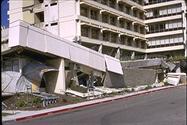Recent earthquakes across the globe in countries including Turkey, Haiti, New Zealand and the United States have brought into harsh light the poor seismic performance of non-ductile concrete buildings. Many of these buildings have high occupancies, including residential, commercial, and critical services. This means the exposure to life and property loss in a major earthquake is immense. Severe damage can lead to critical loss of building contents and risk of ruin for business occupants and partial or complete collapse can result in large numbers of casualties.
These buildings are widespread. Initial work with the Concrete Coalition and the California Inventory project suggests that there are 16,000–17,000 of these buildings in high risk counties in the state. The California Seismic Safety Commission states the following:
“many older concrete frame buildings are vulnerable to sudden collapse and pose serious threats to life.”
EERI and IAEE’s World Housing Encyclopedia contains 26 reports from 20 countries on this construction type, including some of the most populous countries in the world.
Project Approach
The Concrete Coalition is a network comprised of individuals, governments, institutions, and agencies with an interest in assessing and mitigating the risk associated with dangerous non-ductile concrete buildings. There is a lack of in-depth information available for building officials, public policy makers, and the general public regarding the level of risk associated with these buildings. The Concrete Coalition has taken initial steps in addressing this deficiency by using volunteers to conduct inventories in California communities, and combining these estimates with a regression model to make state-wide estimates (see Final Report), by developing a database of case histories documenting performance of concrete buildings in past earthquakes, and by working with engineers and officials in the pilot cities of San Francisco and Los Angeles to develop a tool kit that can help in understanding the problem. These actions aim to provide resources to facilitate seismic safety programs in vulnerable regions.
The Concrete Coalition is a program of the Earthquake Engineering Research Institute, the Pacific Earthquake Engineering Research Center at UC Berkeley, the Applied Technology Council and their partners, including the Structural Engineering Association of California, the American Concrete Institute, BOMA of Greater Los Angeles and the U.S. Geological Survey.

